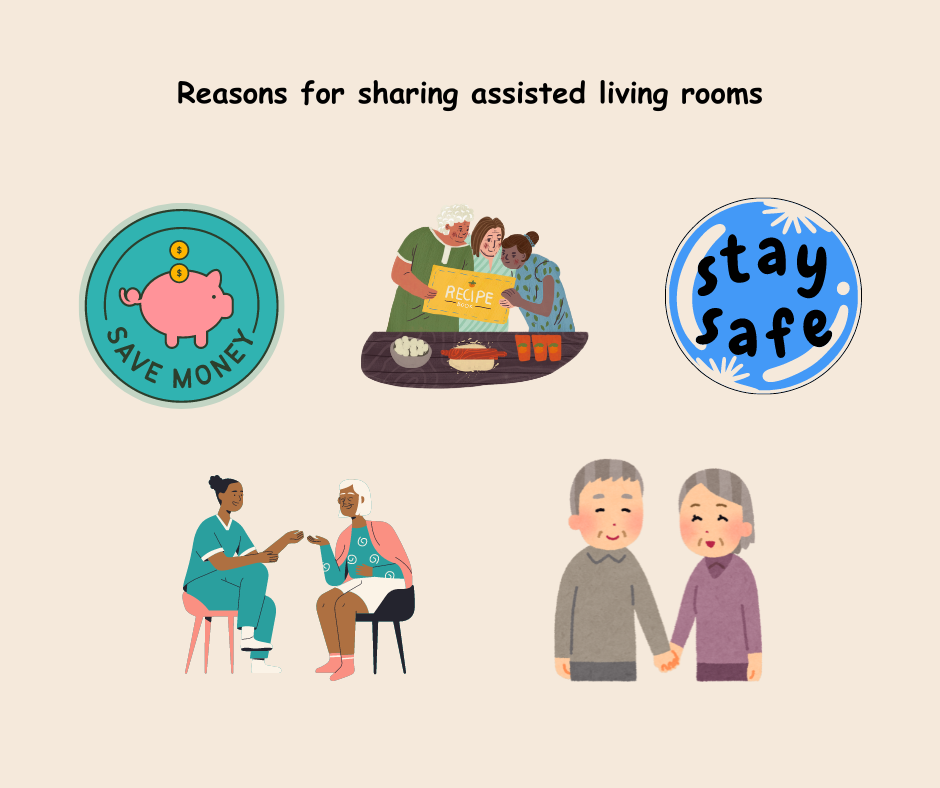Article Contents
Moving into assisted living can be challenging at first. You have to leave behind your home and loved ones and adjust to an entirely new environment. The shift becomes more difficult if you share your room with another person whose personality clashes with your own. However, having an assisted living roommate might have some advantages, too, as it cuts costs and reduces loneliness.
Michelle, a 67 years old housewife, decided to move to an assisted living facility after losing her husband Jim (75) in early 2021. Since she was on a tight budget, Michelle opted to share a room with a fellow resident, Martha. Initially, Michelle was quite uncomfortable since she had never shared a living space with a stranger and was also an introvert. On the other hand, Marth was extroverted and outgoing. Their clashing personalities caused some tension between them and affected Michelle’s mental health. After a period, she requested to move to another room with a roommate whose personality matched hers.
Michelle was lucky that her community recognized and accommodated her needs. But what would you do if you had no choice but to adjust with your assisted living roommate? This blog will explore the pros and cons of having assisted living roommates for seniors, the potential conflicts, and how to handle them. So, read these tips to know how to resolve assisted living conflicts.
Assisted living rooms: why share one?
Assisted living facilities offer different types of rooms, including private, semi-private, and shared rooms. Now, why would one choose to share a room with another person? There could be multiple reasons behind this decision. Here are some of the key reasons for sharing assisted living rooms:
1. Cost saving
Sharing a room is generally more affordable than having a private room in an assisted living facility. The cost of a shared room is typically lower than a private room, making it more accessible for those with limited financial resources.
2. Social advantages
Sharing a room can provide residents with a built-in companion. This can be especially beneficial for those who may feel isolated or lonely living alone. The social interaction and company of a roommate can improve overall well-being and quality of life.
3. Increased safety
Having a roommate can provide an added layer of support and assistance, as well as someone to look out for one another’s well-being. Besides, shared rooms can offer an added level of safety, as someone else is always present to alert staff or emergency services in case of an emergency.
4. Extra caregiver support
In some cases, sharing a room can allow for additional caregiver assistance, as staff can more easily monitor and attend to the needs of multiple residents in a single room.
5. Suitability for couples
Sharing a room can be a suitable option for couples who wish to remain together while receiving the care and support provided in an assisted living facility.

Reasons for sharing assisted living rooms
What are the advantages of living with a roommate?
Let’s look at some of the advantages of living with a roommate in assisted living:
1. Save money
Living with a roommate is an excellent way to save money. Assisted living roommates can not only share the room cost but also food and entertainment costs! It makes for less spending on individual items and leaves more cash in your pocket later.
2. Share chores
The joy of sharing housework with friendly roommates is like having an extra set of hands! They can alternate days, so one person does laundry while another cooks dinner, cutting down on quantity and increasing quality. They may also create a schedule that suits all parties involved.
3. Provide company
Moving into assisted living can be difficult for people. They miss home, kids, and friends, leading to feelings of loneliness and isolation. Having a roommate may help them cope with these problems by filling the role of a friend or family member for you. They have someone else there who knows what it feels like when life gets tough or memories resurface after all these years.
4. Shared interests and experience
Assisted living roommates have shared interests and life experiences, which helps them bond over those things. Whether it be their favorite TV show, hobbies, or how many kids both have, these shared interests will help form a relationship.
5. Support system
Having a roommate there for you when times get tough can be an invaluable support system. Whether it’s because they can lend their expertise or just listen without judging – having them around can make a difference. Especially when you cannot have loved ones around for help.
What Are the Disadvantages of Living with A Roommate?
Now let’s see some of the downsides of having a roommate in assisted living:
1. Lack of privacy
Lack of privacy is one of the biggest disadvantages of having a roommate. If you are a private person, that can be even more challenging. There isn’t much alone time which may lead to feeling awkward or exposed. In addition, you might feel pressure or worry about what they think if their eyes are on every move.
2. Conflicting personalities
If you and your roommate have contrasting personalities, that might cause tension between you. That might make you compromise on the things you love and vice versa. Besides, you both may have different world views, ideologies, and beliefs that may lead to arguments or conflict.
3. Safety risk
Having a roommate can impose certain security risks. But, especially for older adults, disabled individuals, and females, the risk can be much more significant. A bad roommate can cause financial, psychological, sexual, or even physical harm. So, it is vital to take precautions when you have a roommate.
4. Unhelpful
Living with an unhelpful roommate is like being trapped in a never-ending cycle. You both share the same space, so it makes sense for you two to take on some chores and household duties together. However, if one person doesn’t want or isn’t able (because they’re lazy), things can quickly fall apart.
5. Less space
Living with a roommate means you will be sharing the living space. It might not always feel convenient, and there may come some days when you feel suffocated. Besides, while sharing the room, you will also have to be mindful of the furniture. It might not be possible to fit in your favorite coffee table or recliner even if you wanted to!
Causes of Conflicts between Assisted Living Roommates
Most of the incompatibility issuess typically stem from assisted living roommates setting up rules that ignore the other person’s preferences. They have their hobbies, lifestyle, and personality traits. If they have not changed those habits and quirks by now, then it is unlikely that they will ever do so, even if it bothers the other person.
There can be other incompatibility problems as well. For example, if one roommate is extroverted and talks too much while the other is controverted and prefers a quiet environment. Or they might have conflicts while using the TV set, radio, or other shared equipment.
Conflicts may also arise over schedule differences. For example, one roommate might be an early riser while the other likes going to bed late. So, there is a possibility of some disturbance with one person being too noisy when someone else wants some peace & quiet.
Conflict is something that can arise in any shared living situation. It’s important to know about the problems upfront so you take the necessary steps toward preventing these conflicts and exhibit good roommate traits. It is essential that you communicate your needs as a roommate. Be honest about what periods work best for each of you.
14 Types of Conflicts with Assisted Living Roommate
Living with a roommate in assisted living can lead to different types of conflicts. Some of the 14 most common problems include:
- Mishandling of personal items (e.g., damaging or misplacing personal items)
- Using personal items without permission (e.g., clothes, toiletries, phones)
- Disagreements about finances or housework duties
- Eating one’s food without permission
- Messy and untidy living habits
- Poor personal hygiene
- Lack of respect for each other’s space and privacy
- Being overtalkative or noisy
- Having friends and significant others over more frequently than the other roommate(s) prefers.
- Lack of communication
- Different lifestyles and interests
- Rudeness or inconsideration
- Theft or violence
- Changes in health or mood
Living with the tension of an unpleasant situation looming over your head can be living in hell. You need to establish rules upfront so that these situations don’t arise, or else it’ll damage relationships and make life unbearable for everyone involved!
What to Do When Assisted Living Roommates Don’t Get Along?
Assisted living roommates not getting along can be stressful and irritating. But sometimes, that’s unavoidable. However, there are steps you could take to handle the situation amicably. Here are some of the tips:
1. Ask for Help
Don’t hesitate to contact the facility administrator if you think it’d be helpful to have a conflict mediator. However, if your loved one lives in an establishment that doesn’t have such a person, and you feel inaction will lead them down an unhappy path, get involved! You can also ask for help from other sources like friends or family members who can provide support during this difficult time.
2. Communicate
Yes, we know this is easier said than done, but you need to convince your loved ones to talk to their roommate or administrator. There’s no point in stewing all day as only their time is ruined. Have them talk as openly as possible. If they choose to confide in you, be as supportive as possible but maintain a neutral stance and make a case for both parties.
3. Mutual compromise
Another good way to look at things is to ask your loved ones to compromise. Of course, this doesn’t mean they must completely bend to their roommate’s will. But if the little things don’t call for the roommate to change, have them compromise instead.
4. Change in mindset
Your loved one needs to avoid the “me versus them” mentality. It can be very easy for them to fall into that mindset. Help them understand that their roommate is not their enemy. Instead they have the potential to develop a friendship and a trusted companion. As we mentioned, communication is key.
5. Be Ready for Certain Differences
Another example is a roommate who bathes for a long time, hogging the bathroom and perhaps even using up all the hot water. Therefore, discussing habits and rituals that might disturb the other party beforehand is highly beneficial. This is the best to ensure that conflicts don’t arise once your loved one is living with someone.
In some assisted living, roommates don’t share more than the living room space. But this isn’t always the case; sometimes, they even end up sharing bedrooms and bathrooms. It can be nerve-wracking! So, it’s essential to get the details straight ahead when living with a roommate.
You want your living situation and shared space to be comfortable for both parties involved. Therefore, negotiate important aspects, set up mutually agreeable rituals, and keep room for future adjustments!
Rooming with someone can be difficult. It’s important not only to consider your own needs but also those of the other person for everything to go smoothly. If it comes to the point where your senior loved one cannot compromise anymore, try moving to a private room or switching roommates. That being said, some facilities where transitioning is easy, while in some communities, it can be a hassle.
What Can the Staff Do to Prepare and Prevent Such Conflicts?
Sometimes the only solution to overcome roommate disagreements is to request a different one. For example, you might be able to upgrade your parent’s living quarters or room if it isn’t too expensive and they’ll still agree with this decision.
In order to resolve conflicts between roommates, it’s important that both parties are willing and ready to compromise. One way you can do this is by negotiating the TV schedule so each person has their own favorite shows; taking turns de-cluttering the living space; the night owl investing in a reading light and the early riser keeping quiet until the other person wakes up. This may help resolve things amicably between roommates!
If the staff’s attempts at resolution fail, it’d be a good idea to seek help from assisted living administrative staff. It will give them the objective of solving problems amicably without any emotional attachment involved in resolving conflicts. They can simply exercise a pre-existing policy or establish a new one (e.g., lights out or quiet hours rule).
Agreements might be helpful
The assisted living administrator can also help set up a written agreement that both roommates adhere to. For example, scheduled TV hours, light out.
Living with a roommate can be difficult, but it’s not impossible if both parties make an effort. Setting up these agreements might resolve their differences and help them learn how to enjoy being together in the same space, even if it’s not perfect right now!
What Can Families Do about the Conflict?
No matter how old we are, having a roommate can be challenging. There are many things that you might find annoying about your roommate. It could be their quirks or personality- it may be something considered socially inappropriate. After all, sharing your living space with someone is not always easy.
It can be challenging to adjust for those who have been living alone for a long time. Senior citizens, for example, will find it a bit harder to adjust to someone compared to young adults. But it’s not an impossible situation to be in. Here are some tips your loved ones can utilize if they have difficulty getting along with their roommate.
1. Talk to the assisted living facility administrator
If your loved one has informed you about the issues they’re facing, then contact someone immediately. The chances are that they may have some insights into the matter. They probably know how to resolve the conflict due to their experience. Encourage an open dialogue between all parties involved to fix the problem.
2. Be as honest and open as possible
So, your loved one is “tolerating” their roommate and has made their displeasure with them obvious. Stress the importance of being honest. The best course of action will be to discuss the matter as openly as possible. If it’s nothing too big, like the roommate eating loudly or watching TV too loudly, it could be solved by simply asking the other party to turn it down.
3. If all else fails, get another roommate
This is the absolute last resort for obvious reasons but if the differences and issues don’t cease, then perhaps now’s a good idea to ask for a new roommate. However, you need to be careful this time around. After all, you don’t want your loved one to appear overly picky. Encourage the senior to talk to the new roommate and see whether they have shared interests.
4. Request a private room
If you’ve exhausted all options and the issues persist, then perhaps you ought to look into getting a private room for your elderly loved one. Of course, all of this depends on your budget. So be sure to discuss the different types of rooms and arrangements with the assisted living administrator.
Conclusion
In the end, we’d like to say that living with assisted living roommates is tough. Everybody is different, and personalities can often rub up against one another. But that’s alright!
There are some ways to get along with assisted living roommates. Remind your loved one that their roommate doesn’t have to be their best friend. As long as they are respectful, understand their boundaries, and communicate their thoughts, they will be alright. The important thing is to ensure that they can respect one another and live together peacefully. So, if they are having any issues, tell them that they’re free.

Frequently Asked Questions
What is assisted living for seniors?
Assisted living for seniors is a form of long-term care that assists with daily living activities, such as bathing, dressing, and grooming. It also includes help with medications, meals, and transportation. Assisted living facilities typically offer private rooms and shared common areas with many social activities for residents.
How to find assisted living for seniors?
There are a few different ways to find assisted living for seniors. One way is to look online. There are many websites that list facilities in your area. Another way is to ask your friends and family members if they know of any good facilities. Finally, you can call your local nursing home or senior center and ask for a list of facilities in your area.
Can a senior be kicked out of assisted living?
It depends on the specific situation and the policies of the assisted living facility in question. In general, however, it is possible for a senior to be evicted from assisted living. However, this should only happen in cases where the resident is demonstrating dangerous or disruptive behavior, or is not following the rules and regulations of the facility.
Does Medicare pay for assisted living expenses for seniors?
Medicare doesn’t cover any cost of assisted living. It will pay for most medical care incurred while the senior is in an Assisted Living facility, but nothing towards custodial or room & board costs associated with it.

